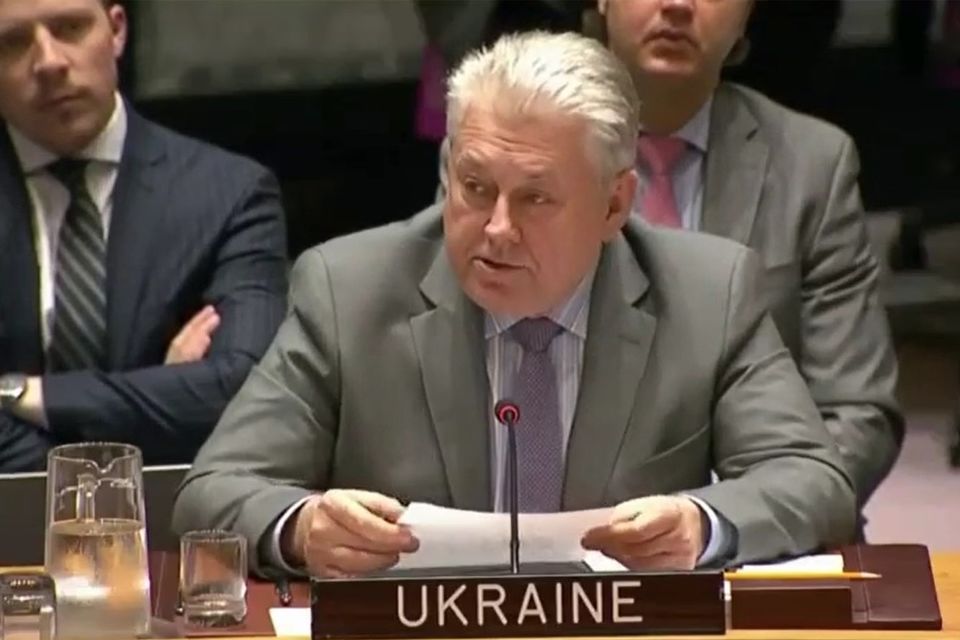Statement by the delegation of Ukraine at the UNSC open debate on the situation in the Middle East, including the Palestinian question

Mr President,
I thank the French presidency for convening this quarterly open debate. Let me also thank the briefers for their valuable insights.
Mr President,
The Middle East is undergoing rapid and fundamental transformation that is accompanied by a wide array of tragic events in Syria, Yemen, Lybia, Palestine and other hot spots.
The Middle East peace process is the alfa and omega of the current situation in the region, as well as the marker of limitations and weaknesses of the existing regional security system. Therefore, any efforts aimed at restoring regional stability should take into account the Palestinian issue.
We join others in welcoming the decision of the Hamas leadership to dissolve the Gaza Administrative Committee and commend the effective mediation of all parties, including Egypt, aimed at advancing the process of the inter-Palestinian reconciliation. We urge the parties to make the best use of the momentum created in Cairo and take further steps to reunite Gaza and West Bank under the legitimate Palestinian Authority. It must be done without delay considering, i.a., the dire humanitarian situation in Gaza.
Given that not much time has passed since we witnessed the escalation in the Temple Mount/Haram Al-Sharif, we should not allow unilateral actions and inflammatory statements to push the situation to the edge.
On the ongoing stalemate in the peace process one can’t but underscore that the continuing expansion of the settlement activities does not contribute to easing the tensions.
Ukraine reiterates its position that Israeli-Palestinian peace settlement lies within the framework of unconditional fulfillment by the parties of the relevant UN Security Council resolutions, the Madrid principles including land for peace, the Roadmap, the agreements previously reached by the parties and the 2002 Arab Peace Initiative. Both Israel and the Palestinians should refrain from taking any action that could undermine the prospects for a peaceful agreement. Yet, the statements of both Mahmoud Abbas and Benjamin Natanyahu in the UNGA last month left an impression that both sides are still oceans apart.
Mr President,
Syria remains one of the hotbeds poisoning the region with the seeds of geopolitical rivalry and sectarian hatred.
We take note of the agreements reached in Astana on the 15th of September, in particular on the Idlib de-escalation zone. Implementation of this arrangement will put to test the overall concept of the de-escalation zones. If the idea works, then a durable nation-wide ceasefire could be within reach, giving a chance for a full-fledged political process.
Ukraine welcomes serious progress achieved in the fight against ISIS in Raqqa and Deir Az-Zor. The conventional defeat of Daesh must herald a new opening and a new hope for the Syrian people.
However, the absence of tangible breakthroughs on the political and humanitarian tracks is a clear sign that so far the military logic prevails over the diplomatic approach. We are concerned by the fact that the number of people living in the besieged areas has not dropped. Thousands of them still have to see countless arrangements and declarations on de-escalation bringing sustainable humanitarian access.
On the whole, international community should avoid at any cost getting into the trap of short-term solutions on Syria. Such ad-hoc fixes seem to deliver temporary relief — only to set the stage for a deeper crisis in the long term.
The fact that no root causes of the conflict have been addressed so far essentially means more opportunities for the Daesh and Al-Qaida recruitment, as well as more potential to capitalize on the grievances of the disaffected population. Under such a scenario any conventional victory over Daesh will have a miniscule impact compared with the reemerging terrorist threat in Syria and wider region.
Therefore we continue to believe that there should be a longer-term blueprint for Syria. The one firmly based on a commitment to the negotiated political settlement and a clear understanding of what will come next.
Mr President,
Ukraine is deeply concerned by the rapidly deteriorating humanitarian situation in Yemen. Millions there are facing a triple threat: food shortages, cholera, violence. The rain season and lack of water resources are set to further aggravate the cholera epidemic. The ICRC estimates that cholera cases could reach a million by the end of the year are simply devastating.
On the security track Ukraine is disappointed by the latest series of statements and provocative actions by the Houthi leadership. The threats to attack Saudi Arabia and the UAE with ballistic missiles is a road to nowhere and a clear disregard for international efforts to resolve the conflict.
The ballistic missile launched against the Government forces on September 19th in Al Jawf province, as well as the attack against on an Emirati ship are all but a reminder of the growing missile and offensive capabilities of the Houthi-Saleh forces.
Only lasting peace will allow to reduce the suffering of the Yemeni people. That is why the continuing absence of dialogue between the parties and their unwillingness to sit at the negotiations table is unacceptable. Further fragmentation of the Yemeni political landscape is a cause of growing concern.
There is a long and difficult path ahead for this country. To succeed this Council has to stand united.
Thank you, Mr. President.
